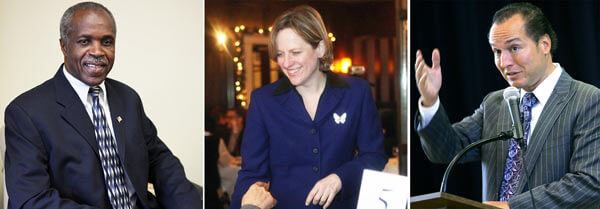By Joe Anuta
Two of the four candidates for borough president served in the City Council at the same time, and records show former state Assemblywoman Melinda Katz and City Councilman Peter Vallone Jr. (D-Astoria) put their mark on the city in different ways.
Katz, endorsed by the Queens Democratic Party and The New York Times, represented Forest Hills, Rego Park, Elmhurst and Kew Gardens from 2002-09 in the Council and had fewer unique laws approved than her competitor, but she had a large hand in shaping the city’s skyline.
Vallone, backed by the United Federation of Teachers and the city’s public safety unions, has served as Astoria’s councilman since 2002 and focused more on public safety and passing bills into law.
The two Democrats are facing off in a primary along with hopeful Everly Brown. The winner will be on the ballot against unopposed Republican Tony Arcabascio in November.
Vallone and Katz voted in concert often, including the contentious move to extend term limits. But the issue of graffiti, for example, exposed two different legislative styles.
One of Vallone’s laws increased penalties for defacing property and for the possession, sale or display of graffiti instruments, while Katz’s law gave judges the option to recommend community service, specifically graffiti cleanup, as part of offenders’ punishment.
In the wake of Sept. 11, both Katz and Vallone voted in favor of asking the state to increase property taxes by 18 percent in the five boroughs, but years later when a 7 percent increase came up for a vote in 2008, Katz voted in favor while Vallone voted against it.
Katz served as chairwoman of the powerful Committee on Land Use for her tenure in the Council, ushering through approvals for large projects like Hudson Yards, a 360-acre mixed-use development in Manhattan; commercial corridors like the Downtown Jamaica Redevelopment Project; and controversial economic development initiatives like Willets Point — which did not then include a 1.4-million-square-foot mall — Hunts Point in the Bronx and a large, mixed-use development along the Greenpoint waterfront in Brooklyn that faced community opposition.
On the other hand, Katz lobbied for increased affordable housing in two of those projects, her campaign said, and also approved downzoning large swaths of Queens from Bayside to Ridgewood during her tenure to prevent overdevelopment in residential areas. She also passed several bills that would require child care centers to release more information to city inspectors and the public, including any types of violations the centers had incurred.
Buses in Queens were once operated by private companies before the Metropolitan Transportation Authority took over, and Katz penned several bills extending the contracts for the carriers.
According to her campaign, she also successfully fought a school co-location in her district and helped several new schools.
Vallone had a hand in shaping the city as well.
A bill written by the lawmaker, who serves as chairman of the Committee on Public Safety, prohibited new installation of solid metal, roll-down gates for storefronts, instead requiring the see-through variety that not only makes neighborhood commercial corridors more inviting but curbs graffiti.
The Council approved a Vallone bill prohibiting the purchase of more than one shotgun within a 90-day period, for example, another stiffening penalties for drag racing and still more pieces of legislation on the implementation of school safety cameras, plastic bag recycling and increasing penalties for thrill-seekers who attempt to parachute or scale the city’s tallest buildings.
He also helped pen the 2004 NYPD anti-racial profiling law and unsuccessful legislation that would have created a registry for gun offenders, his campaign said.
But his stances on public safety sometimes put him at odds with the majority of the Legislature. In 2004, he voted against a resolution that would have condemned the federal Patriot Act, a divisive program which allows domestic surveillance of suspected terrorists.
Vallone was again at odds in 2004 when he voted against overriding the mayor’s veto of a bill that would force companies doing business with the city to offer health benefits to domestic partners. The lawmaker voted against it because it did not allow exemptions for religious organizations, the campaign said.
Reach reporter Joe Anuta by e-mail at januta@cnglocal.com or by phone at 718-260-4566.





































